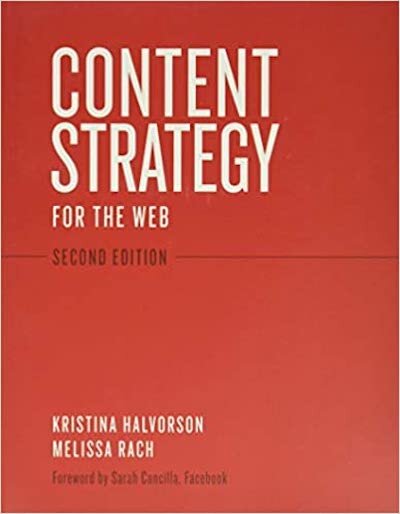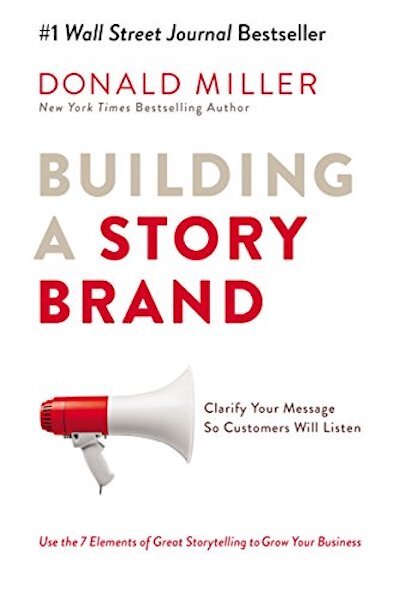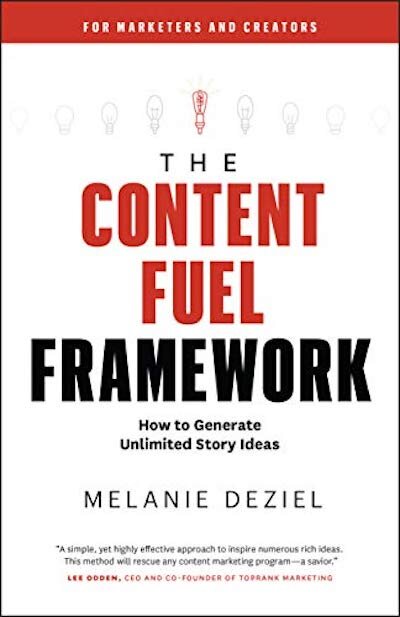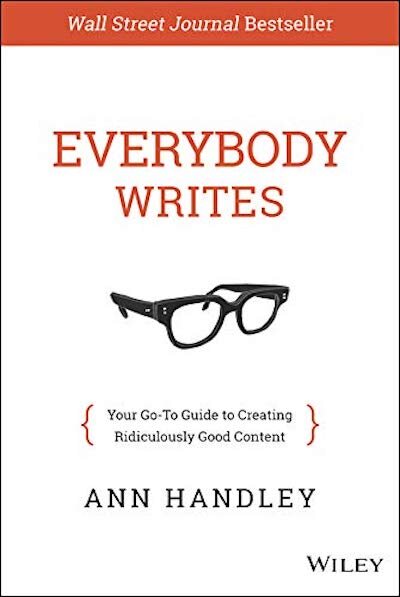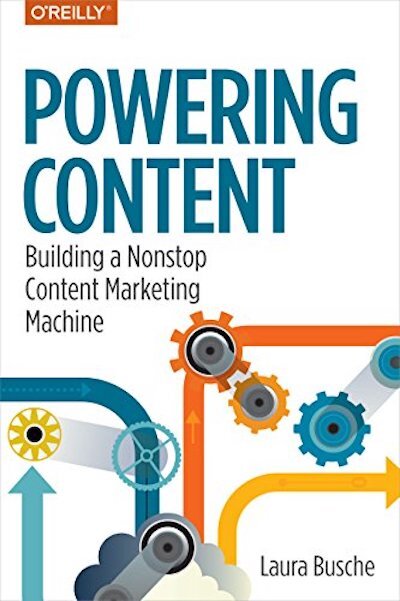The Best Content Marketing Books: 2021
When you’re looking for the best content marketing books, the search process is actually a bit harder than you’d think.
It’s not that there aren’t any good books out there. It’s actually the opposite.
Think about it: books for content marketers by content marketers are created by people who know how to make a compelling argument. It’s their job, day in and day out, to identify and write for an audience, tell a good story, and communicate clearly.
At the same time, content marketing in 2021 is a challenging (and rewarding) task. Content marketers often have to wear a lot of hats: publisher, researcher, project manager, writer, managing editor, copy editor, and the list goes on.
How do you stay sharp and up-to-date on professional development when there are so many evolving needs in your organization?
You attend conferences. You sign up for courses. And you crack open a book (or 12).
To help make at least a fraction of that process a little easier, I’ve curated a list of the most relevant, helpful, and actionable books for content marketers in 2021. Each list includes some additional details: an overview of the book, along with who might benefit the most, what resources are included, and a key takeaway quote to help you decide if it’s worth your while.
Top foundational content marketing books
Content Chemistry: The Illustrated Handbook for Content Marketing by Andy Crestodina
“This book is a training manual,” writes Crestodina in Content Chemistry’s introduction. “This book is also a reference.” Only a book that’s incredibly detailed and thorough could accurately claim to be both.
Divided into a theoretical section called “Lecture” and a practical section called “Lab,” Content Chemistry is full of years’ worth of research, expert contributions, diagrams, examples, and more, including wisdom from Bruce Lee. It’s a rich, fun, incredibly useful resource for both new and experienced content marketers.
Audience: Mostly beginner to intermediate, but there is so much here to pull from that more advanced content marketers will also gain a lot from having this book as a reference.
Resources: ALL OF THE RESOURCES. Seriously. Explanations, diagrams, charts, pro tips, delightful illustrations, screenshots of content marketing in action—it’s all here.
ISBN: 0988336499
Key content marketing quote: “Introverts and extroverts, number-crunchers and big-picture thinkers—content marketing has something for everyone. The one non-negotiable for any content marketer? You must write.”
2. Content Strategy for the Web, 2nd Edition by Kristina Halvorson
Let’s take a moment and think about how WILD it is for a book about digital content strategy written in 2012 to still be just about perfectly relevant.
Content Strategy for the Web is a delightful, straightforward introduction to content strategy as a whole. Halverson covers what a strategy contains, how it works as a process, who contributes to it, and how it evolves and changes in the real world. Emphasizing the importance of finding the happy place between business objective and user needs, she zeroes in on foundational principles that have remained more or less consistent over the past decade.
For example, one of my favorite pages in this book is a brilliant little chart that helps readers diagnose some of the ways where content may be neglected in their organizations across business units. If you’re new to content strategy and not exactly sure where to start, start here.
Audience: Beginner to intermediate (think a junior content marketer or someone who has tried and failed at making content work for their organization)
Resources: Some really great diagrams, lots of examples, a content strategy reading list, and lots of encouraging real talk throughout.
ISBN: 0321808304
Key content marketing quote: “Web content is never really finished. Sorry.”
3. Epic Content Marketing: How to Tell a Different Story, Break through the Clutter, and Win More Customers by Marketing Less by Joe Pulizzi
A wonderful overview of content marketing from general concept to strategy to process, execution, and reporting, Pulizzi’s book is another solid investment for the content marketer’s bookshelf. Pulizzi pulls in case studies and guest authors for small snippets of perspective throughout the book, and each chapter ends with a list of additional resources as well as main takeaways for busy readers.
Packed with helpful content marketing examples as far back as John Deere’s magazine in the 19th century (as well as a lot of humor and personality), Epic Content Marketing isn’t just a textbook on content marketing; it’s the textbook.
Audience: Beginner to intermediate
Resources: Charts, examples, external resources at the end of each chapter, and additional bonus material on the book’s website
ISBN: 0071819894
Key content marketing quote: “Your customers don’t care about you, your products, or your services. They care about themselves, their wants, and their needs. Content marketing is about creating interesting information your customers are passionate about so they actually pay attention to you.”
4. Influence, New and Expanded: The Psychology of Persuasion by Robert Cialdini
Probably one of the most well-known books on this list, Influence explores seven psychological principles or decision-making “shortcuts” that make it easier for people to say “yes” without thinking. The book explains how these shortcuts can be used (and abused) to persuade others. It also dives into how we as consumers and independent thinkers can protect ourselves from being manipulated.
The new version of this book touches a lot on how to be persuasive within the bounds of the relationship that exists—essentially, how to build and maintain trust and use persuasive techniques ethically.
Audience: All; there’s a lot of good stuff here for beginners and practiced pros alike.
Resources: Pretty theoretical; some illustrations and examples throughout
ISBN: 0062937650
Key content marketing quote: “You and I exist in an extraordinarily complicated environment, easily the most rapidly moving and complex ever on this planet. To deal with it, we need simplifying shortcuts. We can’t be expected to recognize and analyze all the aspects of each person, event, and situation we encounter in even one day….Instead, we must often use our stereotypes, our rules of thumb, to classify things according to a few key features and then respond without thinking when one or another of the trigger features is present.”
5. This Is Marketing: You Can't Be Seen Until You Learn to See by Seth Godin
Marketing isn’t about you. That’s the four-word summary of This Is Marketing, a manifesto about what it means to be a marketer in a world where marketers have earned a bad rap. Full of examples and insight, this book is an argument for empathy, patience, and respect in positioning, research, content creation, and distribution.
Audience: All. The lessons are simple, but they’re about skills that require lifelong practice.
Resources: Reading list and a “Simple Marketing Worksheet” to help identify your audience’s needs and how best to reach them
ISBN: 0525540830
Key content marketing quote: “Marketers make change happen. Each of us is a marketer, and each of us has the ability to make more change than we imagined. Our opportunity and our obligation is to do marketing we’re proud of.”
Best content marketing books for writers
6. Building a StoryBrand by Donald Miller
“Storytelling is just data with a soul,” says Brene Brown. If this is true, then Building a StoryBrand is about presenting the right data in the right order to resonate with the right soul. Miller’s framework is a seven-part sequence based on the Hero’s Journey trope.
Building a StoryBrand doesn’t work for every brand or for every story, but it’s one of the copywriting classics that millions of content creators rely (and riff) on. It’s a good idea to know the rules before you break them, and Miller offers undebatable value in his framework for how to put the customer first.
Audience: Beginner content marketers and copywriters
Resources: The framework itself is very practical, with lots of examples and tips. The book also includes a StoryBrand roadmap and a list of other branded resources for the franchise.
ISBN: 0718033329
Key content marketing quote: “Just as the customer is always right, the customer is also always the character. Your story should focus solely on the needs and wants of your customers; this way, when your customers want something in real life, your story, and thus your product, will quickly come to mind.”
7. The Content Fuel Framework: How to Generate Unlimited Story Ideas (For Marketers and Creators) by Melanie Deziel
“How long would it take you to come up with 100 content ideas for your brand or company?” Deziel challenges her readers. Most people would probably say they couldn’t. The Content Fuel Framework is a process for generating 100+ content ideas based on a 10x10 grid: 10 focuses (types of topics) and 10 formats.
While this book doesn’t dive deep into how to evaluate those ideas for business value, potential reach, content/market fit, etc., it’s definitely one of the best content marketing books in the past year with lots of examples for pure idea generation.
Audience: Beginner to intermediate
Resources: Examples, charts, and the framework itself. There’s also a corresponding PDF workbook available for purchase on Deziel’s website.
ISBN: 1734329009
Key content marketing quote: “We know that a content idea is made up of these two things: a focus and a format. But here’s the key: it’s not simply that you need one of each — a focus and a format — to create a complete content idea. The order in which you select these two elements is important, too. Always start with the focus, and then determine which format is best suited to the story that you want to tell.”
8. Everybody Writes: Your Go-To Guide to Creating Ridiculously Good Content by Ann Handley
See you later, Strunk and White. This book is probably THE content writer’s handbook for our millennium. As a college writing instructor, I often had to unteach my students all the bad writing habits that they picked up in high school. Handley is on a mission to unteach those plus all the stuffy, wordy, academic writing conventions that I hammered home. And I love her for it.
Value-focused business writing is clear, simple, and compelling. Handley approaches writing from a very democratic point of view (“You are a writer, and you write more than you think!”) and presents new “writing rules” and tips in a way that makes them easy to understand and fun to put into practice. As one of the best content marketing books for practical advice, it’s not the newest out there, but it also never gets old.
Audience: Beginner to intermediate content writers
Resources: THE MOTHERLODE. In addition to tons of examples and in-chapter resources, the last section of the book is a catalog of writing and research tools, content generators, style guides, and more.
ISBN: 1118905555
Key content marketing quote: “Good content—and good writing—doesn’t preach or hard-sell. Instead, it shows how your product or service lives in the world, explaining in human terms how it adds value to people’s lives, eases troubles, shoulders burdens, and meets needs.”
Best content marketing books for managers and leaders
9. Powering Content: Building a Nonstop Content Marketing Machine by Laura Busche
An incredible resource not only about content marketing but more specifically about creating sustainable content practices. Busche dives into the three main roles of a content lead: content strategist, content creator, and content management. “It takes heaps of unsexy tasks to achieve a few sexy results,” she says.
Busche thrives in details and marketing operations. She clearly explains how to optimize, automate, and manage content production and distribution by setting up repeatable, scalable processes that make everything just a little easier. A great roadmap for content marketing leaders and marketing executives wanting to scale.
Audience: Intermediate to advanced content marketers or managers looking to optimize processes and scale their content production
Resources: Templates, planning exercises, step-by-step guides to performing tasks across content strategy, creation, and management. Also a “Content Marketer’s Dictionary” and a “Content Manager’s 360° To-Do List”
ISBN: 1491963743
Key content marketing quote: “Reading about Henry Ford’s life helped me understand the importance of reproducing stellar work through a continual process. Extending it. Projecting it. Scaling it. I soon discovered that content is both an art and a science. Both masterpiece and routine. Craft and task. It should be exceptional enough to strike as unique—and repeatable enough to be scalable.”
10. They Ask, You Answer: A Revolutionary Approach to Inbound Sales, Content Marketing, and Today's Digital Consumer by Marcus Sheridan
From Amazon: “Consumer behavior is changing dramatically. Most people are able to educate themselves about products like never before, and they demand quicker and more convenient solutions. In response, companies need to adopt a customer-centered philosophy: They Ask, You Answer. It’s a way of thinking that prioritizes educating buyers about their purchasing decisions, earning their trust through transparency, and making every interaction as accessible and convenient as possible.”
Sheridan dives into what’s behind this shift in consumer behavior, how this translates to blurred lines between marketing and sales departments, and why Sheridan’s content marketing methodology has had a substantial impact on educating and empowering customers. Full of well-reasoned principles and in-depth case studies, including from River Pools and Spa, Sheridan’s own company.
Audience: All. As the title suggests it’s a simple principle, but some of the most interesting parts of the book are how this principle is challenged or deprioritized organizationally.
Resources: Imbued throughout the book are excellent case studies. There’s also (naturally) a Q&A session in the last section of the book with more tactical questions around implementing They Ask, You Answer into the content ideation and production process.
ISBN: 0316359521
Key content marketing quote: “The fact is, every industry has hundreds of questions about what prospects and customers want to know when they’re making a buying decision. Whether it’s B2B or B2C, everyone wants to feel like they’ve made an informed buying decision….The irony is that every industry has hundreds of buyer-based questions. It is the sad reality that most company websites don’t even address more than a few dozen of these questions.”
11. Product-Led SEO: The Why Behind Building Your Organic Growth Strategy by Eli Schwartz
Schwartz argues that instead of having to scramble to adapt to the latest algorithm updates, SEO and content marketers should focus on the user. As search engines like Google incorporate more and more AI, it’s becoming harder to game the system, and the companies that prevail in SEO will be the ones who prioritize and value user experience.
It’s full of broader strategy as well as examples and helpful tips for implementing Product-Led SEO into content marketing practice and infusing a “product-led” mindset across an organization.
Audience: Intermediate. Rather than providing a step-by-step guide to SEO, Schwartz offers managers and executives a deeper dive into how SEO works from a theoretical perspective.
Resources: More theoretical than tactical, the book doesn’t include many additional resources, but it’s full of case studies and examples of companies who have implemented Product-Led SEO to great success
ISBN: 1544519567
Key content marketing quote: “The ‘product’ is the collection of anything on your site used to draw in the user, whether those are widgets, articles, photos, apps, downloads, webinars, or really anything at all….Product-Led SEO builds a great product for users first and optimizes for search second.”
12. The Social Organism: A Radical Understanding of Social Media to Transform Your Business and Life by Oliver Luckett
Full of vibrant storytelling and examples of how social media has transformed our collective consciousness, The Social Organism proposes that social media is more “alive” than we give it credit for. Luckett argues that our social networks work more like biological organisms than a series of algorithms. And thus we can apply lessons from biology to understand how to optimize our social posts and use them for good.
Audience: Intermediate to advanced: this is fairly technical and definitely geared toward an audience that has some experience thinking about social media from a philosophical point of view
Resources: Several diagrams to illustrate the relationship between biology and social media; not much in the way of practical resources.
ISBN: 0316359521
Key content marketing quote: “We might think we’re ‘performing’ certain desirable versions of ourselves, but there’s no guarantee the audience will see it that way. Their responses to our performance, the choices they make in how to portray it, can do as much to determine the public persona that emerges out of the interaction as we can.”
13. The Culting of Brands: Turn Your Customers into True Believers by Douglas Atkin
It might seem a little Machiavellian, but Atkin’s thesis is this: great brands operate like cults. They begin with empathy and deep understanding and position both themselves and their prospective audience as “different.” People join cults for the same reason as they align themselves with brands: they need to feel a sense of belonging and identity and make meaning in a world of chaos. Atkins argues that there isn’t much difference between a Krishna and a Harley rider, which is a refreshing—if unorthodox—take. Great for marketers looking for a new perspective to drive content strategy and production.
Audience: Intermediate
Resources: Lots of examples from iconic brands and how they work, but this book is otherwise entirely theoretical. No worksheets or practical tools here.
ISBN: 1591840961
Key content marketing quote: “Today’s most successful brands don’t just provide marks of distinction (identity) for products. Cult brands are beliefs. They have morals—embody values. Cult brands stand up for things. They work hard; fight for what is right….Brands function as complete meaning systems.”
I'm a content strategist helping B2B SaaS companies leverage empathy to communicate value, empower customers, and drive revenue. You can learn more about my content strategy process, 1-on-1 consulting calls, and group training workshops, and I’d love to connect with you on LinkedIn!



